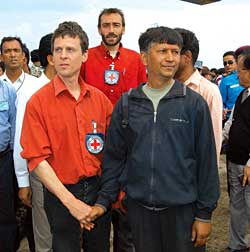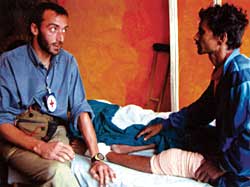 Its strict neutrality and low profile work in looking after prisoner welfare in times of war means the International Committee of the Red Cross (ICRC) doesn't usually figure in the limelight.
Its strict neutrality and low profile work in looking after prisoner welfare in times of war means the International Committee of the Red Cross (ICRC) doesn't usually figure in the limelight. But sometimes, as during the release by the Maoists of 37 Beni prisoners, the ICRC makes it to the headlines. Nicolas Bachmann, communi-cations delegate at ICRC in Nepal takes pains to stress his group doesn't mediate in conflict and, unlike other national Red Crosses, is not usually involved in delivering relief after natural disasters. Even in the Beni prisoner release, it wasn't the ICRC that made the first move.
"We just acted in the capacity of a neutral intermediary," Bachmann told us. The Maoists contacted the ICRC to facilitate the release, which they seem to have been done to prove that they respect the Geneva Convention. Efforts are reportedly underway to make contact with the 40 policemen seized in the Pashupatinagar raid on 9 April.
More than most other humanitarian organisations working in conflict zones, the ICRC has to take its neutrality extremely seriously. One slip, speaking either for or against any side, could cost the ICRC its credibility. Its neutral status has earned this non-political international humanitarian organisation the complete trust of governments, rebels and even terrorist groups across the world. This is why Bachmann picks his words carefully, and will not be drawn to comment on any aspect of the Nepal conflict.
 The ICRC was founded by Henri Dunant, who saw thousands of wounded soldiers after a 16-hour battle at Solferino in Italy where more than 40,000 Austrian and French were either killed or injured. Horrified, he sought help from locals to get medical attention for all soldiers regardless of their nationality. A commission was formed in 1863 by five Swiss nationals, including Dunant, which later became the International Committee of the Red Cross. Twelve countries along with Switzerland then worked on each of the four Geneva Conventions after World War II, ensuring protection of civilians during war and of prisoners after conflict.
The ICRC was founded by Henri Dunant, who saw thousands of wounded soldiers after a 16-hour battle at Solferino in Italy where more than 40,000 Austrian and French were either killed or injured. Horrified, he sought help from locals to get medical attention for all soldiers regardless of their nationality. A commission was formed in 1863 by five Swiss nationals, including Dunant, which later became the International Committee of the Red Cross. Twelve countries along with Switzerland then worked on each of the four Geneva Conventions after World War II, ensuring protection of civilians during war and of prisoners after conflict. Now that most wars around the world are domestic conflicts in which civilians constitute most of the victims, the ICRC is kept busy. It reminds belligerents of the limits of war and the behaviour of combatants. It has initiated a worldwide endorsement of international humanitarian law of which almost all the countries, including Nepal, are signatories.
The ICRC has worked in Nepal out of its New Delhi base, but as the conflict became more serious it finally opened an office here in 2001. It got only grudging support from the government. For instance, its vehicles did not have blue plates and carried Geneva numbers till recently.

 ICRC delegates in Nepal are involved in visiting detainees, supporting medical care of the wounded and encouraging security forces and the Maoists to adhere to international humanitarian law in warfare and treatment of detainees. They also work closely with Nepal's Red Cross Society in relief of the wounded and providing family links with detainees.
ICRC delegates in Nepal are involved in visiting detainees, supporting medical care of the wounded and encouraging security forces and the Maoists to adhere to international humanitarian law in warfare and treatment of detainees. They also work closely with Nepal's Red Cross Society in relief of the wounded and providing family links with detainees. The ICRC team has made many visits to army barracks and police stations to assess the condition of detention cells, the treatment of detainees and record disappearances. It doesn't use Nepali staff during these visits and even the interpreters are non-Nepalis. "This is so that we don't lose our neutrality and objectivity," Bachmann explains.
After the visits and interviews with detainees, the team submits a confidential evaluation report and recommendations to improve the conditions of detainees. The ICRC has completed about 900 visits in more than 300 detention posts around Nepal. "We have easy access to detainees as we always keep our reports confidential," adds Bachmann.
The ICRC has also collected complaints from the relatives of detainees and submitted a list of missing relatives to the authorities. Families are informed as soon as news is available. With the cooperation of the Nepal Red Cross Society, the ICRC also exchanges messages between family members and detainees.
There was a time when the ICRC only hired Swiss citizens but today it is a patchwork of different nationalities, although there are restrictions. For instance, the French aren't hired in Rwanda. And in Nepal, a British or American ICRC delegate would not be a good idea.


